While streaming and torrenting are some of the best benefits of a VPN service, people value online privacy and security incredibly. Thus, top-rated VPN services are always characterized by rock-solid security and things like leak protection and a no-logging policy. In this TorGuard vs NordVPN comparison, we’re talking about two highly secure providers that built their reputation through years of existence and hard work.
These services count millions of satisfied users together, making the comparison very interesting.
TorGuard got its name from torrenting, while NordVPN’s relentless pursuit of perfection led it to become one of the most prominent names in the industry. Both services offer a plethora of security features and they have some unique qualities that’ll be mentioned today.
Needless to say, this battle will consist of 9 comprehensive tests, and at the end, we’ll count the points and determine the winner. The NordVPN vs TorGuard VPN duel for 2025 will see us talk about not only privacy/security but also streaming, app compatibility, support, and even pricing.
Therefore, if you’re in dire need of a new VPN, yet, you’re thinking about getting NordVPN or TorGuard, this is the article for you. In the end, you’ll know everything about their pros and cons, which will allow you to make a smarter decision and invest your money the way you want.
TorGuard vs NordVPN: Apps & Ease of Use
To compare TorGuard and NordVPN, we first need to talk about their app compatibility and ease of use. Since we’re talking about two premium providers, app support should be on the top level.
In theory, TorGuard and NordVPN are very similar, as they support all major and less popular devices.
Both of them work on iOS, Android, Linux, macOS, Windows, Fire TV, Android TV, and even routers. Because of router support, these VPNs also work on gaming consoles, Apple TV, and other platforms that don’t natively support VPNs.
However, in practice, NordVPN’s user experience and support for devices is a bit better than TorGuard’s due to that final polish that I’ll mention in a minute. The setup guides are much simpler in NordVPN and due to better customer support, you’ll feel at home with this provider.
On the flip side, TorGuard has one big advantage and that is the number of simultaneous connections. Depending on the subscription plan, you can get 8, 12, or 30 connections per account, which is far more than the 6 connections you get with NordVPN.
If you’re using two or three devices, this shouldn’t be an issue. But if you’re a power user and you want to share your subscription with friends or family, TorGuard will do a slightly better job at keeping your devices protected at the same time.
TorGuard
Okay, let’s now talk about the user experience in this TorGuard VPN vs NordVPN duel. TorGuard isn’t a polished service and its apps look a bit outdated, especially on Windows where I’m using it. Mobile apps are a bit better and in my opinion, they also work more reliably.
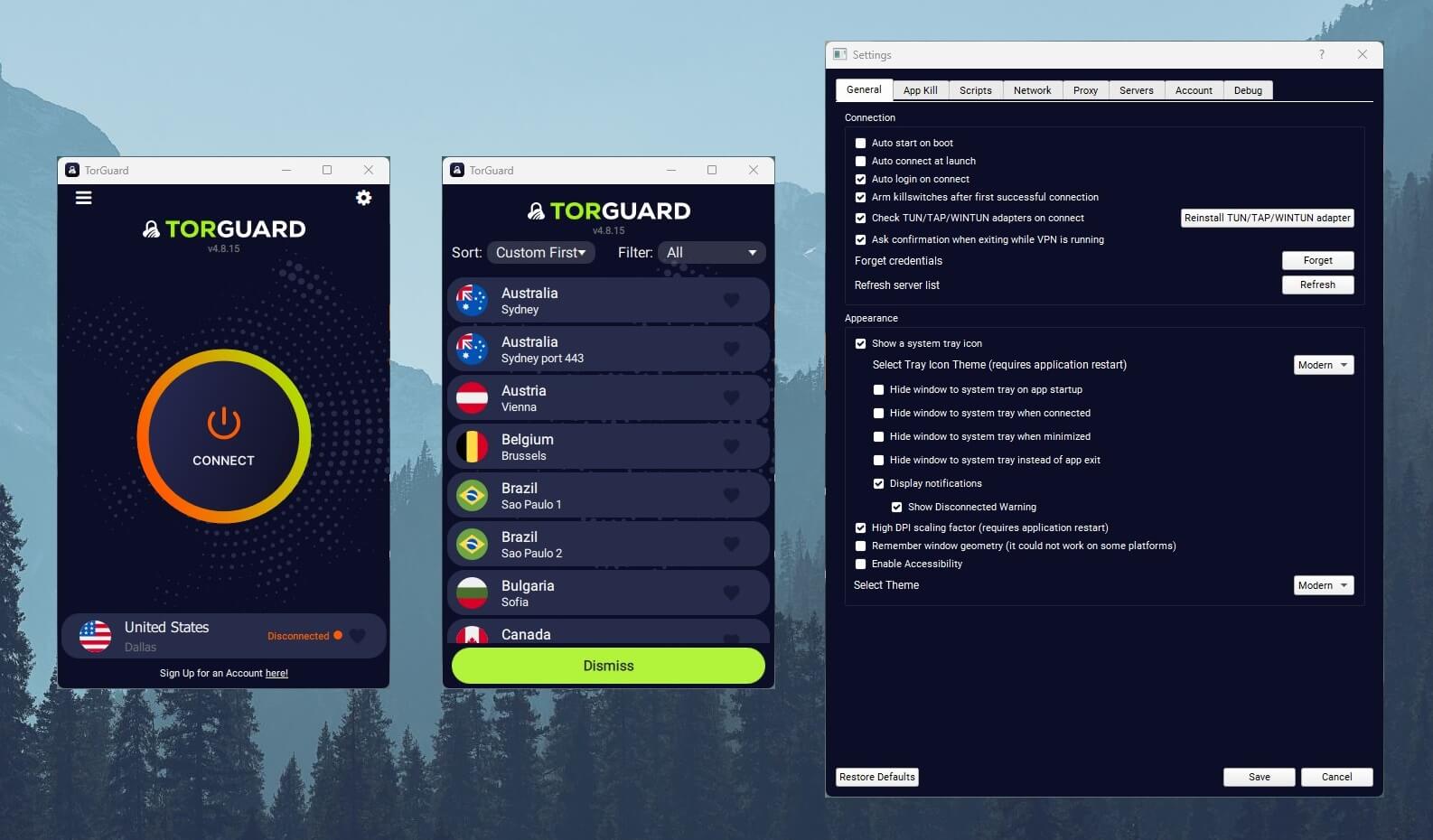
On my PC, I found that the main functions of the app work well. There’s a big connection button in the middle and opening the server list is below when you click on the selected country. On the server list, choosing the country is done with a single click but the VPN doesn’t connect immediately.
Instead, you have to use the button in the middle, after which, it takes about 6-8 seconds for TorGuard to verify your new public IP. Opening Settings can be done via the gear icon in the top-right portion of the screen.
The screenshot above shows you how Settings look – on the far right side of the screenshot. It looks kinda messy and not very intuitive considering TorGuard is feature-rich and supports various customization options. The interface could be a lot better.
For me, the app is far from pretty but I’d lie if I said that it has serious issues. It’s bug-free and comes with all the bells and whistles you’d expect. The final polish isn’t there and I hope TorGuard addresses this issue and modernizes the app in 2025 or beyond.
NordVPN
NordVPN is the largest VPN service in the world – even larger than ExpressVPN which I reviewed not long ago. With a budget so large, Nord Security developed NordVPN’s app with an incredible taste for intuitiveness, modernism, and simplicity.
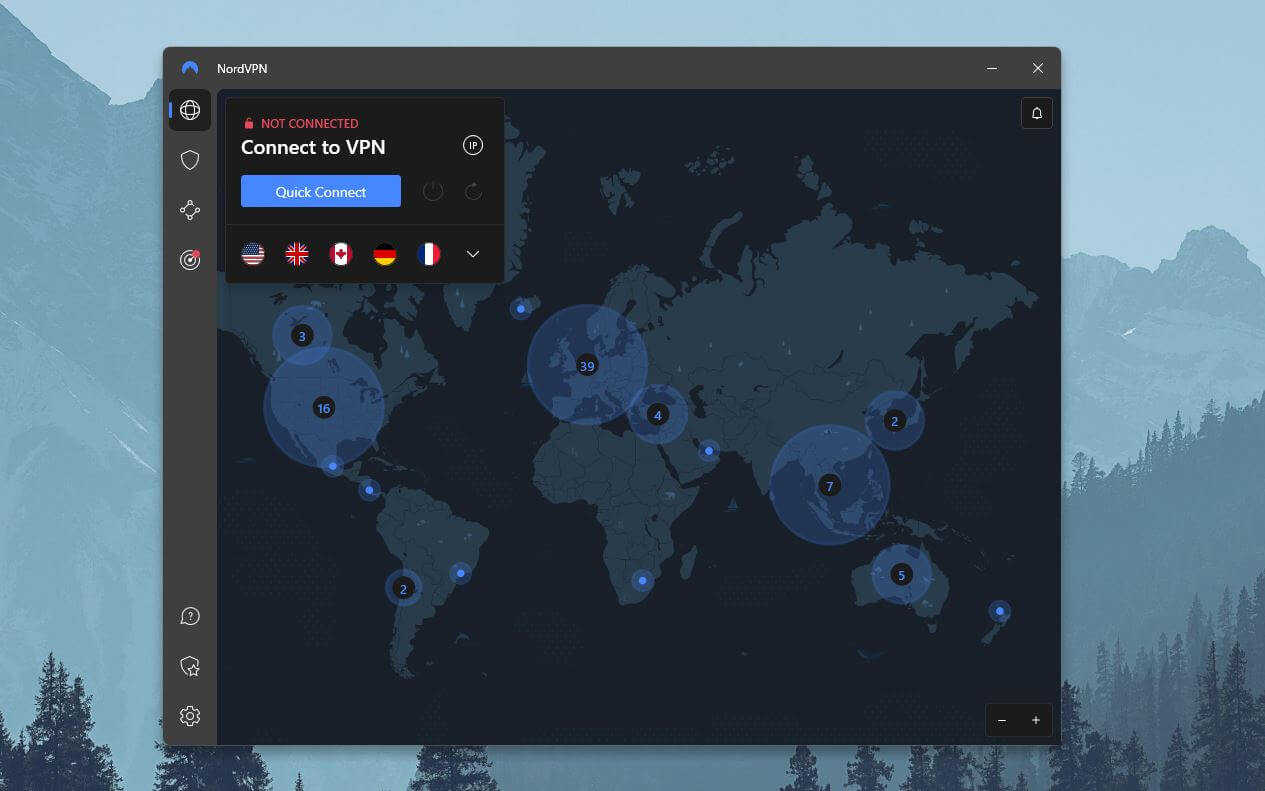
The app looks rather simple and its interface can be customized even by choosing themes. Although I prefer this dark look, a white look is also here if you don’t mind straining your eyes. Moreover, the server list is accessible with a single click of a mouse and the provider supports one-click connections.
Just click on the country you want and in no more than 2-3 seconds, the connection to a server in that country will be established. The server list features specialty servers too and on the left-hand side of the app, you can see all of its features at any given moment.
For example, you can access Dark Web Monitor on the left or open Threat Protection to prevent viruses and malware from infecting your PC. Settings are accessible through the gear icon where NordVPN did a good job at putting important features to the forefront so that you’re always ready to find them easily.
The kill switch has a separate menu, for instance, and you can easily change the protocol or open DNS settings. NordVPN’s world map can also be used to connect, which is unique. The app looks the same on iOS/Android counterparts and works equally well.
When you put these services side-by-side, you can clearly see that NordVPN is more “premium” than TorGuard, which is to be expected given the scale on which both companies operate.
Who Wins?
The first round of this TorGuard vs NordVPN battle is pretty tough. NordVPN’s polished app design and better device support go against TorGuard’s number of simultaneous connections which can go up to 30, as opposed to just 6 in its rival.
Still, this isn’t enough for a clear win, so NordVPN WINS by providing a much more pleasant user experience coupled with superb app compatibility.
Security & Privacy: Which One Is Safer to Use?
Some people are wondering if VPNs are legal and safe but when using premium providers like these, the answers to both questions are YES. However, the question is HOW safe and secure they are and in this part of the TorGuard vs NordVPN duel, I’m going to answer it fully.
Security Features
Let me start with the security features because we have a lot of ground to cover. As is the case with every VPN, some similarities are present because these services are built upon the same base – encryption, tunneling, and other popular terms.
Both services use 256-bit AES encryption, although TorGuard allows you to lower it to 128-bit encryption at the expense of security but with increased performance. Moving on, the kill switch is present in both services and so is IPv6/DNS leak protection.
Another thing worth mentioning is that both services offer private DNS servers used for routing your traffic and shielding it from third-party, free DNS services known for spying on your online activities. Furthermore, the providers both have support for OpenVPN.
Although they offer different protocols, OpenVPN is a common thing and an important similarity to mention. Now, what about ad-blocking capabilities? We can say these providers are identical in this regard but NordVPN offers something called CyberSec, a traditional ad-blocker.
TorGuard has this Ad-Blocking DNS which can be enabled in Settings. It does the same job using a different principle, which also functions properly and disables annoying ads and pop-ups. The final similarity is that both services utilize RAM-based servers.
As such, they’ll wipe every bit of information with each restart, ensuring the total privacy and anonymity of each user.
What Are the Differences?
With so many similarities, these providers also manage to be very different. One feature I liked in my NordVPN test was NordLynx. This is a proprietary protocol based on WireGuard, which further improves not only speeds but also security and privacy.
TorGuard has WireGuard and something called OpenConnect, neither of which are as good as NordLynx and its superb infrastructure. Moving on with the comparison, NordVPN has Threat Protection, which includes CyberSec plus malware protection and antivirus.
This will ensure your device stays completely safe as you browse the web, as each online threat is immediately eliminated or put into quarantine. NordVPN’s Double VPN servers are exceptional and they’ll double your encryption, making you twice as secure online due to double encryption.
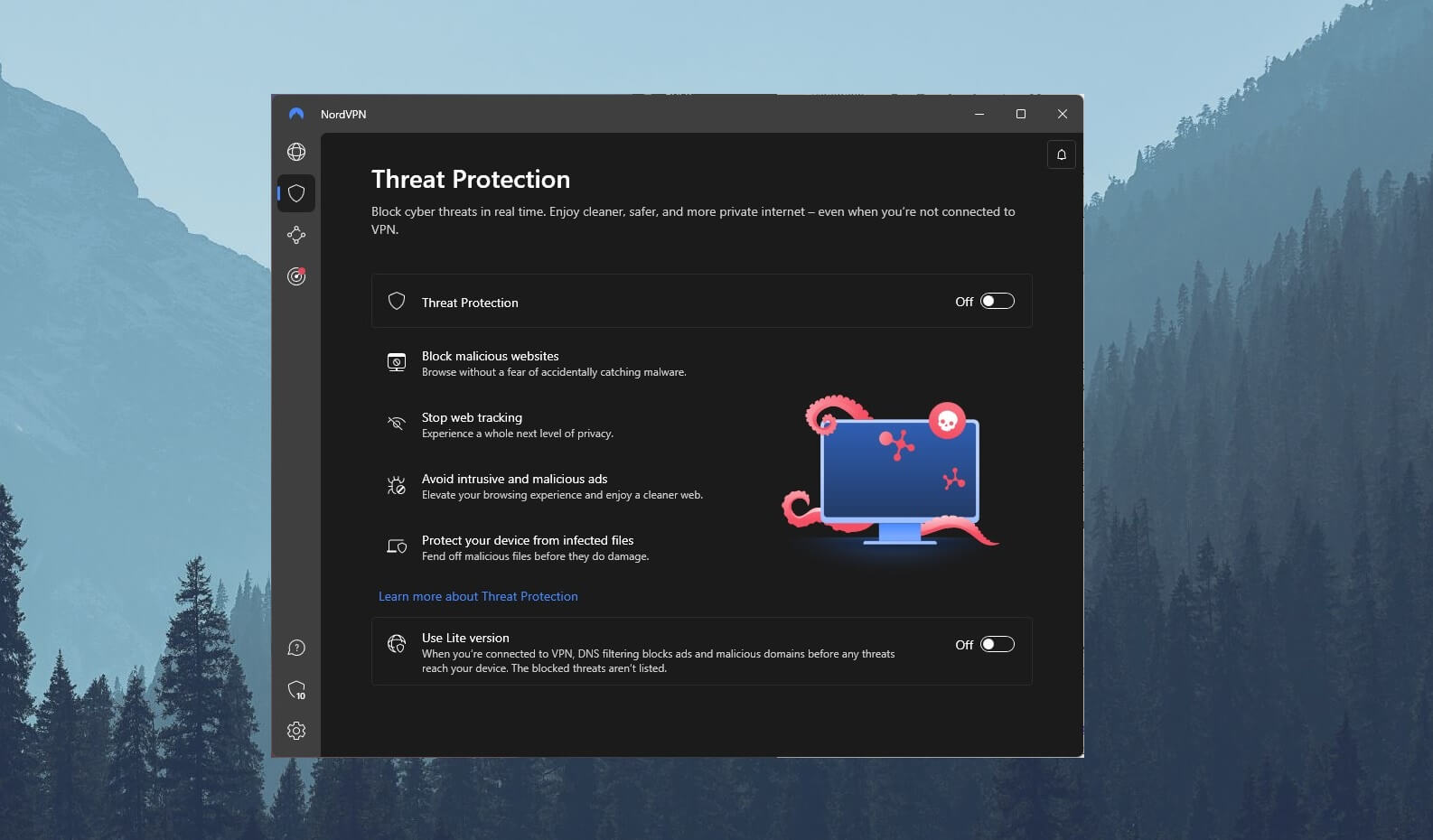
We should also point out NordVPN’s Meshnet. This feature ensures the ability to host and join safe LAN parties suitable for business users and gamers. Last but not least, the provider’s kill switch will work on the system and the app level and you also get split tunneling!
Split tunneling isn’t available in TorGuard and neither is antivirus/anti-malware. You instead get support for proxies and the ability to select from a range of DNS servers from Cloudflare, Google, and other popular providers.
Protocols can be customized too and thus, you can select the STunnel version for OpenVPN or determine the MTU size for WireGuard. There’s something called Stealth Proxy here and it’s suitable for bypassing censorship in a similar fashion to NordVPN’s obfuscated servers.
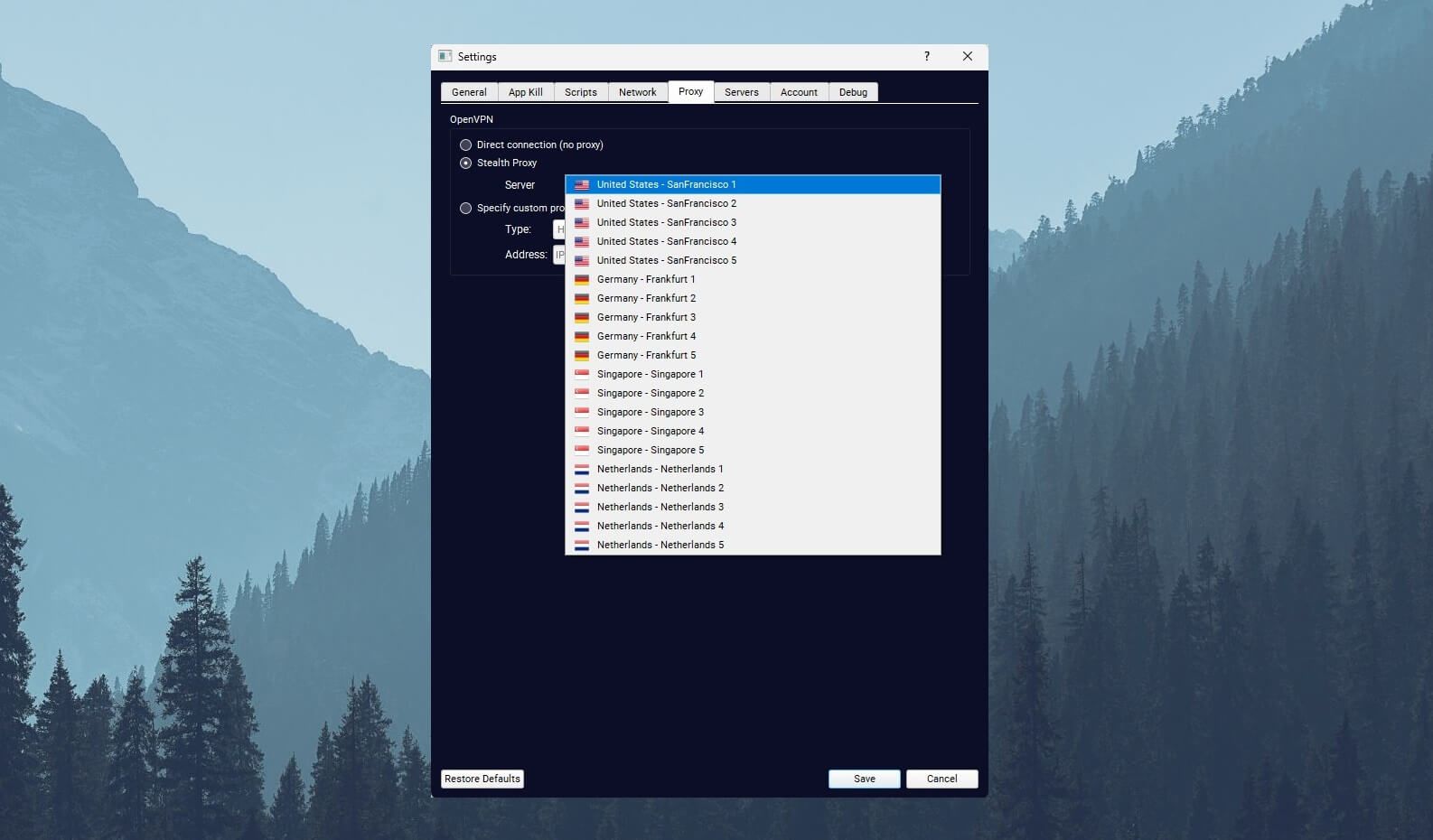
Unique to TorGuard is the ability to write custom scripts. This allows you to execute certain actions upon particular events. An action can be executed before connection, after connection, or after disconnection, allowing you to fully customize the way the VPN works.
TorGuard also comes with port forwarding and SOCKS5 proxy which NordVPN doesn’t offer. But, on a grand scale, it’s obvious that the latter is more feature-rich than TorGuard, and thus, wins only a portion of this important NordVPN vs TorGuard comparison of security.
Is There a No-Logs Policy?
It’s time to talk about privacy now and by that, I mean their logging practices. Not gonna lie – we’re talking about two serious providers that take your privacy as their #1 priority. Still, they’re very different, which is reflected in their jurisdictions.
TorGuard is a pure US-based provider with the company’s location in Orlando. NordVPN resides in Panama and this is a much better jurisdiction for privacy due to the lack of data-retention laws that we have in the United States.
Let’s not forget that the US is a 5 Eyes founder, and along with New Zealand, the UK, Canada, and Australia, we’re talking about a high degree of government surveillance and data collection. That, fortunately, doesn’t make TorGuard a dangerous provider to use.

So far, TorGuard successfully maintained a no-logging policy and hasn’t had a single leaking incident like IPVanish or HMA, for instance. The provider is great for torrenting and going on the darknet safely, with no logs of your DNS requests, IP address, geolocation, or browsing history.
It stores minimal logs such as your payment data and other information you see in the screenshot above. These are by no means compromising logs and won’t infringe on your privacy. Besides, TorGuard allows you to opt out of certain data collection regarding Matomo analytics, so everything’s okay.
The provider has no external audits and I’d say this is a big deal because we don’t have an official certification of its privacy and security claims. NordVPN rectifies this issue by having two audits from PricewaterhouseCoopers and one from Deloitte, adding to its trustworthiness.
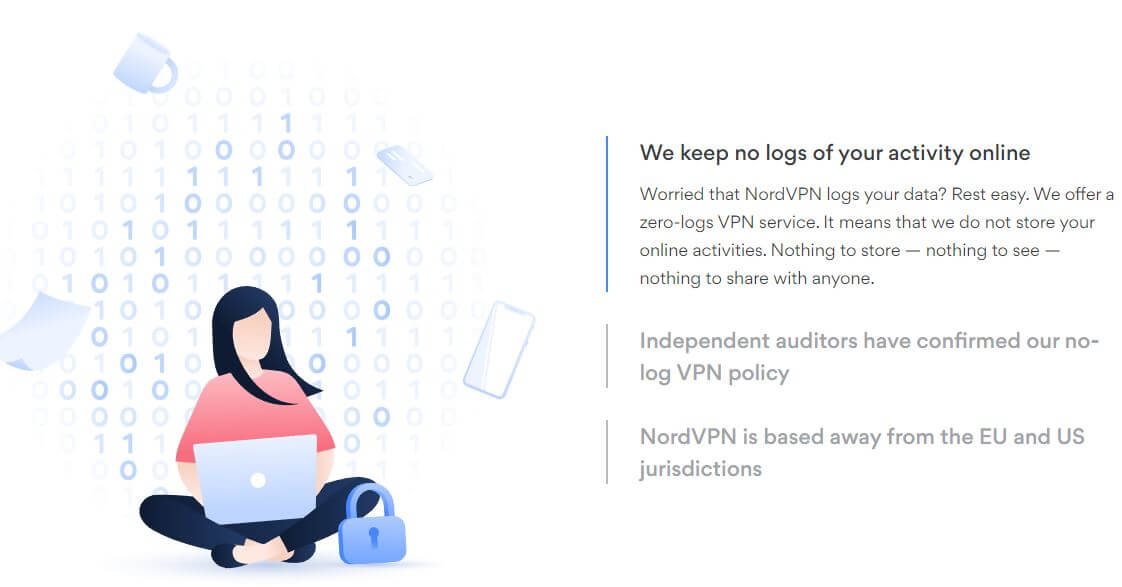
As such, this company also follows a no-log business model with no traces of your personal data on its servers. The only collected information is your payment info, email, and a few bits of technical data to make sure the service works as intended.
Being based in Panama, it’s not obligated to keep any logs, and thanks to RAM-based servers, even if the provider is compromised, not a single bit of data could be extracted from its servers. That’s why it’s so reputable and popular among privacy enthusiasts.
Who Wins?
At the end of this round, we can say that NordVPN WINS. It has more security features, and although not as customizable as TorGuard, its no-logs policy has three security audits, whereas, TorGuard has none of them. NordVPN is also based in Panama, while its rival’s jurisdiction is the US.
This makes the Panamanian provider more trustworthy and reliable in keeping you safe and secure online.
TorGuard vs NordVPN Streaming Test
Streaming-wise, this is a fairly interesting comparison. NordVPN and ExpressVPN are two of my favorite providers for streaming due to how reliably they can bypass geo-blocks and let me access blocked websites regardless of my location.
NordVPN, in particular, is also great and its servers are all optimized for this purpose. This means it allows for easy access to popular streaming services, foreign TV channels, and even restricted betting sites, even though you aren’t going to stream anything there.
Mind you, this is all possible simply by leaving the protocol on Automatic and choosing the respective server location. On the other side of the ring, we have TorGuard and its streaming performance that’s subpar if you just go ahead and purchase it.
Out of the box, it won’t work with the most popular streaming services and you’ll find it hard to unblock US and Canadian TV channels. That’s because TorGuard offers special Dedicated Streaming IP addresses, each costing $7.99/mo per country.
Only then you’ll be able to bypass any geo-restriction and unblock the platform you want. We tested numerous streaming IPs from TorGuard and I can tell you they’re not as great as NordVPN in terms of streaming, as we still found that TorGuard VPN is blocked from time to time.
That’s not to say that it’s bad for streaming. It IS decent but you have to pay $7.99 for a single streaming IP on top of the subscription. And if you want several IPs in different countries, you’ll be looking at quite a hefty price each month, which many users won’t be ready to pay.
Who Wins?
This round of my NordVPN vs TorGuard comparison has a clear winner. NordVPN WINS because it’s better at streaming and requires no add-ons to work properly. TorGuard’s streaming IPs cost additionally, making streaming with it pretty expensive.
TorGuard vs NordVPN Speed Comparison: Which One Is Faster?
When talking about streaming, we should also talk about how fast these VPNs are. Since NordVPN and TorGuard have cutting-edge security protocols and RAM-based servers, you should get a good combination of performance and security.
To make sure this is the case, I tested both providers thoroughly and I’m going to talk more about my speed test results in a minute. For now, I think it’s a good time to show you my native internet speeds when I’m not using a VPN.
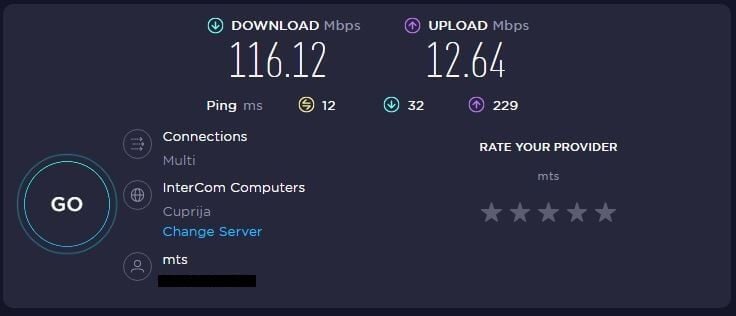
These speeds are going to be the reference for my comparison. By the way, I’m located in Eastern Europe and I used four server locations to test both providers, including:
- The United Kingdom
- The United States
- Australia
- Japan
Keep in mind that I didn’t change the protocol I was using. With both services, I set this option to Automatic, ensuring that they pick the best protocol according to the server and other VPN-related parameters to get the best performance.
With my testing parameters explained, let’s move on with this NordVPN vs TorGuard VPN speed comparison and see which service is faster in 2025.
TorGuard
UK:
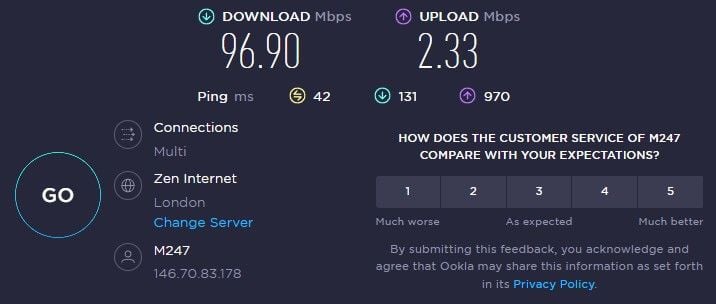
US:
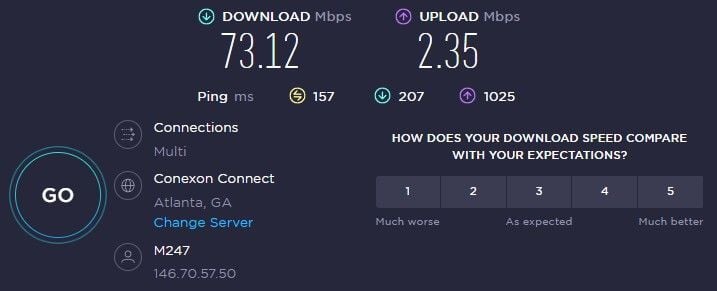
Australia:
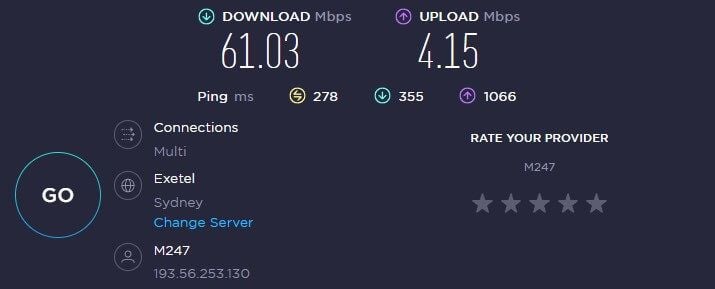
Japan:
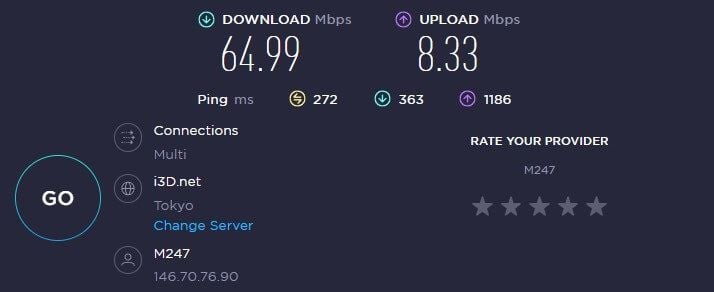
NordVPN
UK:
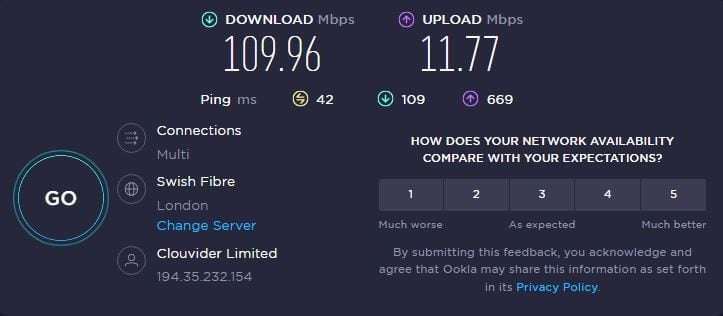
US:
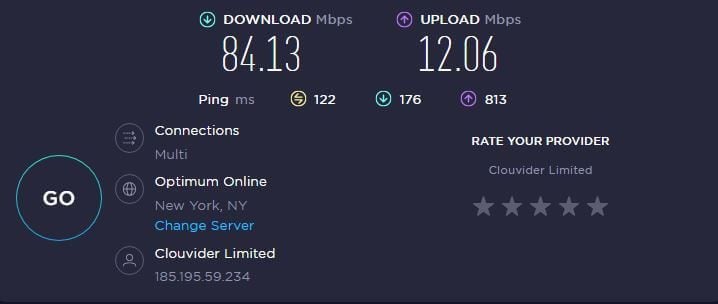
Australia:
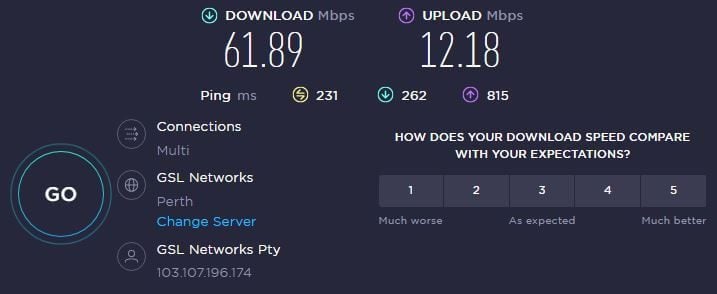
Japan:
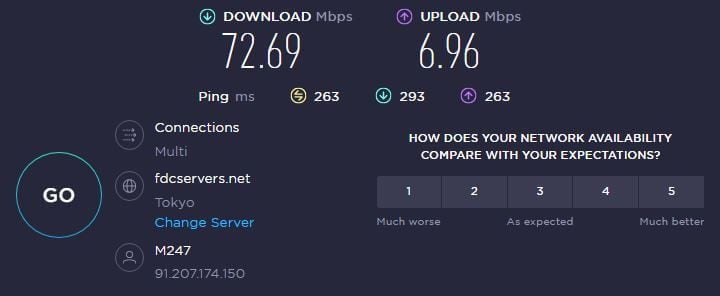
Who Wins?
Checking the speed test results, it’s clear that neither of the VPNs is slow. However, NordVPN WINS this round due to being much faster overall, which is especially prevalent on servers in the UK, the US, and Japan.
While the server in Australia showed similar performance, NordVPN’s upload speeds were much faster than TorGuard’s, with slightly lower latency across the board. It’s, however, more than enough for the Panamanian to take the win even in this round.
TorGuard vs NordVPN : Torrenting
Torrenting is the name of the game when talking about TorGuard. The service offers P2P servers across the entire network, all supported by features like SOCKS proxy, port forwarding, and decent performance. This is essential when looking to maximize your torrenting performance.
I found TorGuard very satisfactory in terms of torrenting and P2P activities in general. Due to its focus on privacy and security, you can be sure that you’re downloading torrent files in complete anonymity, all with the ability to have great speeds.
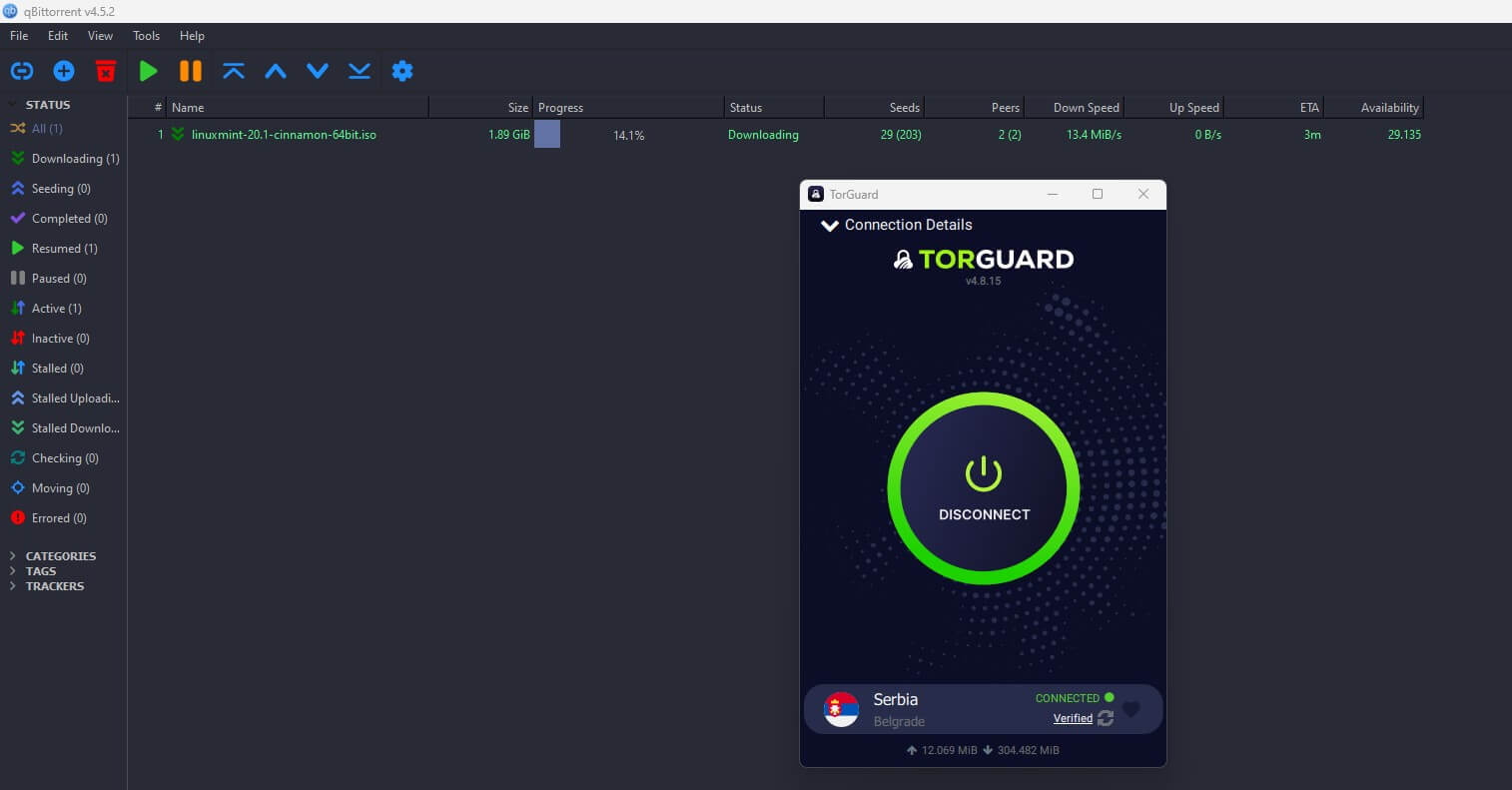
If the server you’re using is slow, you can always request port forwarding and boost the performance. However, I used a server in my country and downloaded torrents freely without any workarounds. In short, you’ll have no issues with TorGuard regarding torrenting.
NordVPN is also optimized for P2P and it has thousands of P2P dedicated servers. Just open the server list, click once on P2P, and you’ll be connected to the fastest server. Once again, this works rather well, and while using it with uTorrent, BitTorrent, and other clients, the experience was enjoyable.
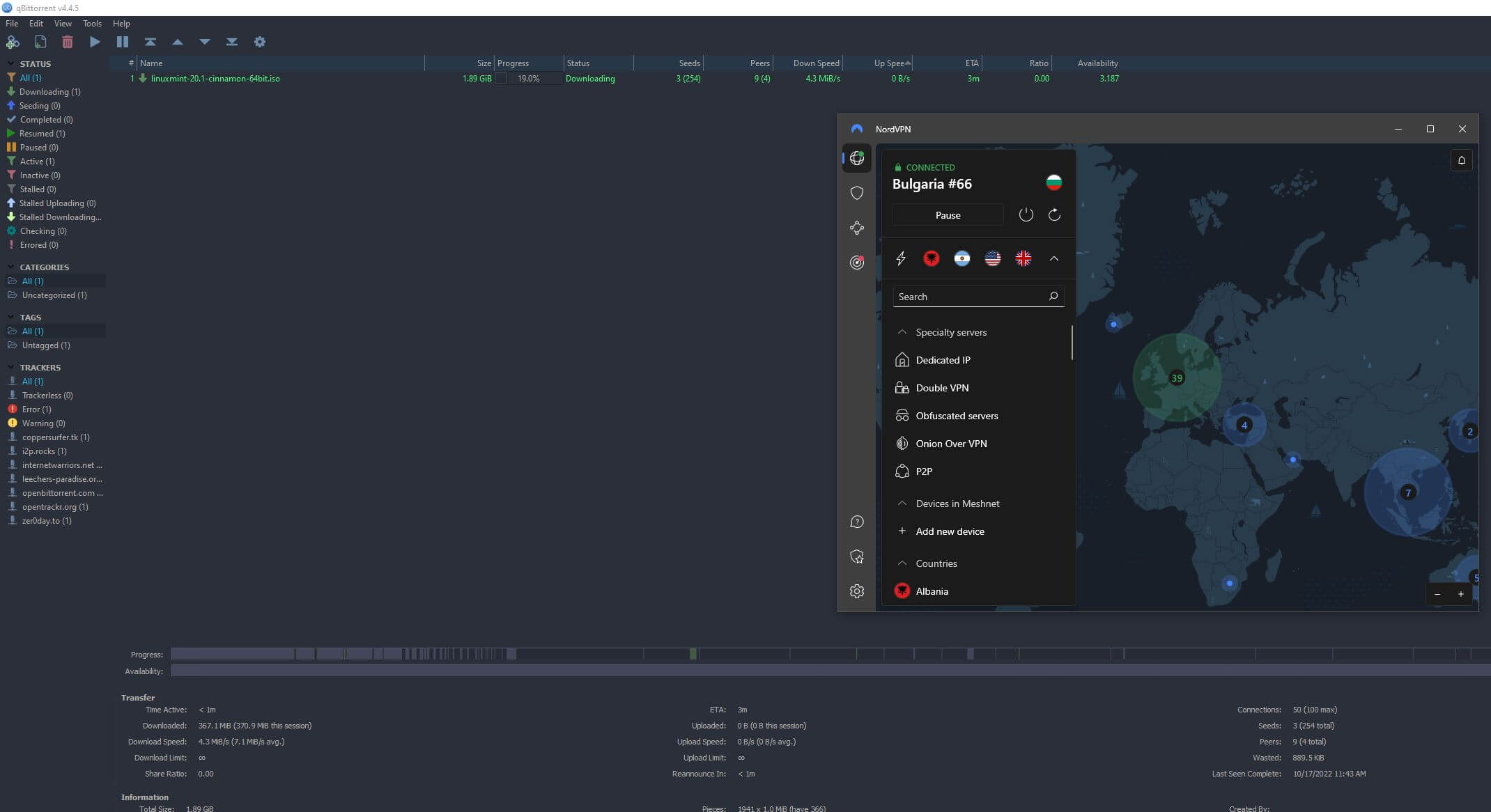
In terms of speeds, I saw no difference, to be frank. Both services performed extremely well and with no lags, slowdowns, or issues with seeds/peers which non-P2P providers tend to produce.
Who Wins?
This part of my NordVPN vs TorGuard comparison is a DRAW. Both services are capable of torrenting, and thanks to optimized servers for P2P, you can enjoy the highest level of performance even if you connect to more distant server locations.
Are NordVPN and TorGuard Working in China?
Many users look for a VPN in Turkey to bypass censorship in this country. However, while finding a VPN that works in this country isn’t very hard, finding one that works in China is incredibly difficult. Will TorGuard and NordVPN work, though?
The answer is, believe it or not, yes! Let’s start with TorGuard. This provider offers obfuscation but more importantly, there’s this Stealth Proxy I mentioned earlier. By choosing one of many Stealth Proxy VPN servers, you can bypass the Great Firewall of China, although not very efficiently.
On average, our testers in China reported that TorGuard works 5 out of 10 times but it can still be used somewhat properly. Unfortunately, Stealth Proxy isn’t blazing-fast, so even if you manage to connect, you can expect a speed reduction to a certain extent.
NordVPN remedies this issue through the use of obfuscated servers. These servers aren’t proxies but rather full-fledged VPN servers with obfuscation that take advantage of OpenVPN TCP. OpenVPN TCP is a great solution for overcoming censorship along with OpenVPN TLS.
That’s why NordVPN works much better in China and censored countries in general. Our testers reported the efficiency 10/10 times, which means each attempt to connect in China is successful. This provider is also faster thanks to NordLynx, so users in this country can expect better performance.
Who Wins?
While both providers work in China to an extent, NordVPN WINS this round as well. It’s more efficient and offers obfuscated servers that can bypass the Great Firewall pretty much every time, unlike TorGuard which won’t be as capable and reliable.
NordVPN vs TorGuard Server Fleets
So far in this NordVPN vs TorGuard duel, the Panamanian provider was pretty brutal, winning almost every round. However, let’s talk about the server fleets and see which provider is bigger and more versatile in terms of servers.
NordVPN (6,000+ servers in 60+ countries)
NordVPN’s server network is a testament to what a reliable, feature-rich, and secure VPN service should look like. You see, this provider has 6,000+ servers in 60+ countries, and yes – ExpressVPN, Private Internet Access, and CyberGhost have larger server networks, to be honest.
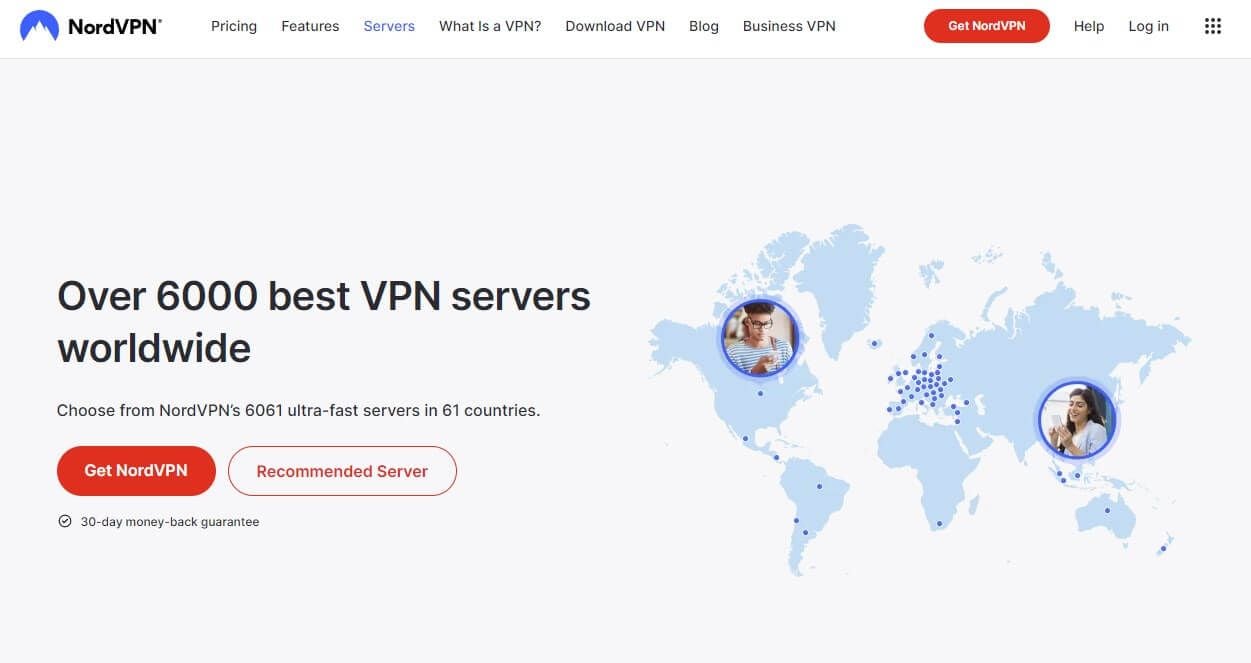
However, this provider has incredible variety and on its server list, you’ll find Double VPN, P2P, obfuscated, and onion over VPN servers where the last ones are here for accessing the dark web with 100% safety and anonymity.
Not only that but the provider has dedicated IP servers, which is a bonus feature that very few providers offer. The server distribution is excellent as well. You get 2,000+ servers in the US alone, along with many servers in Europe, South America, and even Africa and Asia.
NordVPN’s servers in the UAE are great too, and while there aren’t any servers in India, you get coverage of many other popular countries to make up for it. Generally speaking, I’m extremely satisfied with its server network since we’re talking about 10 Gbps, RAM-based servers.
TorGuard (3,000 servers in 50+ countries)
TorGuard does a great job at keeping up with its fierce rival. It has 3,000+ servers in more than 50 countries. It’s definitely smaller than NordVPN but having 3,000+ servers worldwide is an impressive feat, especially knowing that many providers skimp on the server count.
In terms of variety, TorGuard won’t reinvent the wheel. It has no streaming servers until you purchase them separately and the same applies to a dedicated IP which you can buy as well. Instead, you’ll find obfuscated servers and Stealth VPN servers, both aimed at bypassing censorship.
The server distribution isn’t that bad and with 50 countries in place, TorGuard VPN can indeed cover some ground. The most numerous are US-based servers, although you can find plenty of them in the UK, Europe, and even countries like Brazil and Hong Kong.
Compared to NordVPN, TorGuard has Indian servers, which means you can, for example, watch Hotstar if you’re not located in India. However, don’t expect miracles from the provider unless you buy a dedicated streaming IP for eight or so dollars a month.
Who Wins?
In this round of comparison, NordVPN WINS by having a larger server fleet and more countries to choose from. Plus, it has better server distribution with many specialty servers, such as Double VPN, onion over VPN, obfuscated, and P2P servers.
TorGuard has servers in India, however, and NordVPN doesn’t, but it’s still not enough to win against a juggernaut like this provider.
Customer Support: TorGuard or NordVPN?
Customer service should display a high level of reliability and incredible responsiveness when talking about premium services. We all know that free services fail in this regard but it’s not rare to see premium providers not doing well support-wise (I’m looking at you, ProtonVPN!).
With NordVPN, you’ll have zero issues. It offers 24/7 live chat support which you can contact at any time of the day or night and get help immediately. Email support is splendid as well and it’s very fast to respond, almost as if you were using live chat all along.
In addition, there are numerous FAQs and how-to guides on the site, which I found very handy. All of this is supported by a YouTube channel with lots of subscribers and frequent uploads, adding to NordVPN’s trustworthiness and communication with its user base.
TorGuard is a much smaller provider and it can be seen in its customer support. For example, its primary method of contact is email and live chat support can be utilized only when it’s available. Logically, it’s not there 24/7, so you can’t contact it at just about any time you want.
Most of the time, you’ll stick to either email support or the community forum where you can get help from moderators or other users. TorGuard also has a YouTube channel but its uploads are very rare and the last uploaded video was a few years ago at the time of writing.
Who Wins?
Judging by everything we said, NordVPN WINS this round against TorGuard. It’s obvious. NordVPN’s support is significantly better and thanks to the presence of 24/7 live chat support, getting help is possible at any time of the day or night, making the provider much more dependable.
Pricing Comparison: How Cheap TorGuard and NordVPN Are?
Before wrapping things up and calling this TorGuard VPN vs NordVPN comparison quits, let’s talk about the prices of these providers. I’ll start with NordVPN and its more straightforward pricing structure that isn’t going to confuse you.
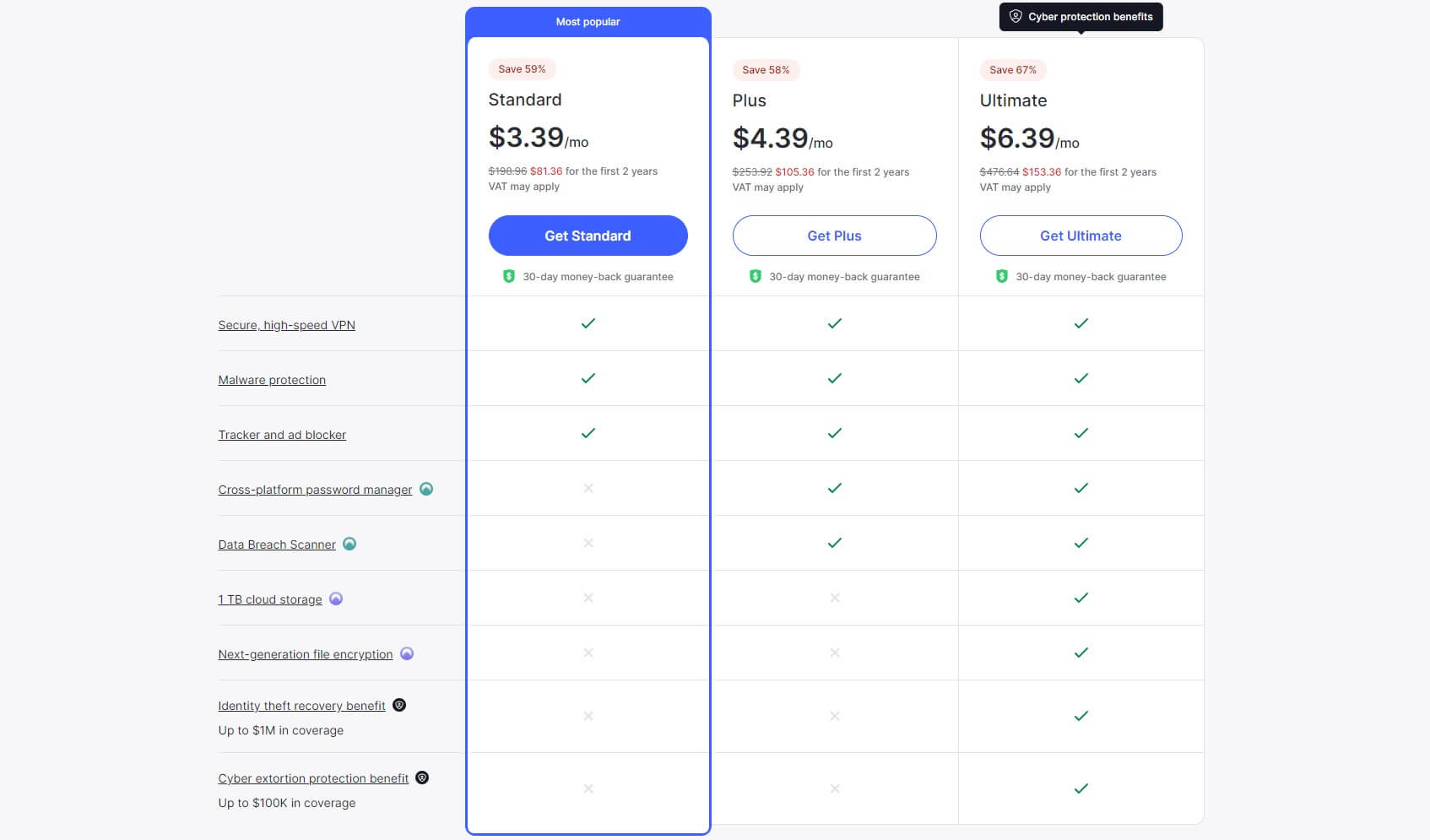
The prices you see above are for the provider’s 2-year plan. I’m showing you the cheapest possible prices for NordVPN, although there are annual and monthly plans that are more expensive. The Standard plan is most likely going to be your choice.
It includes the VPN, while Plus and Complete plans include NordPass and NordLocker for added convenience. Either way, ALL plans on its site offer a 30-day money-back guarantee, meaning that you can get a full refund in the first 30 days for whatever reason.
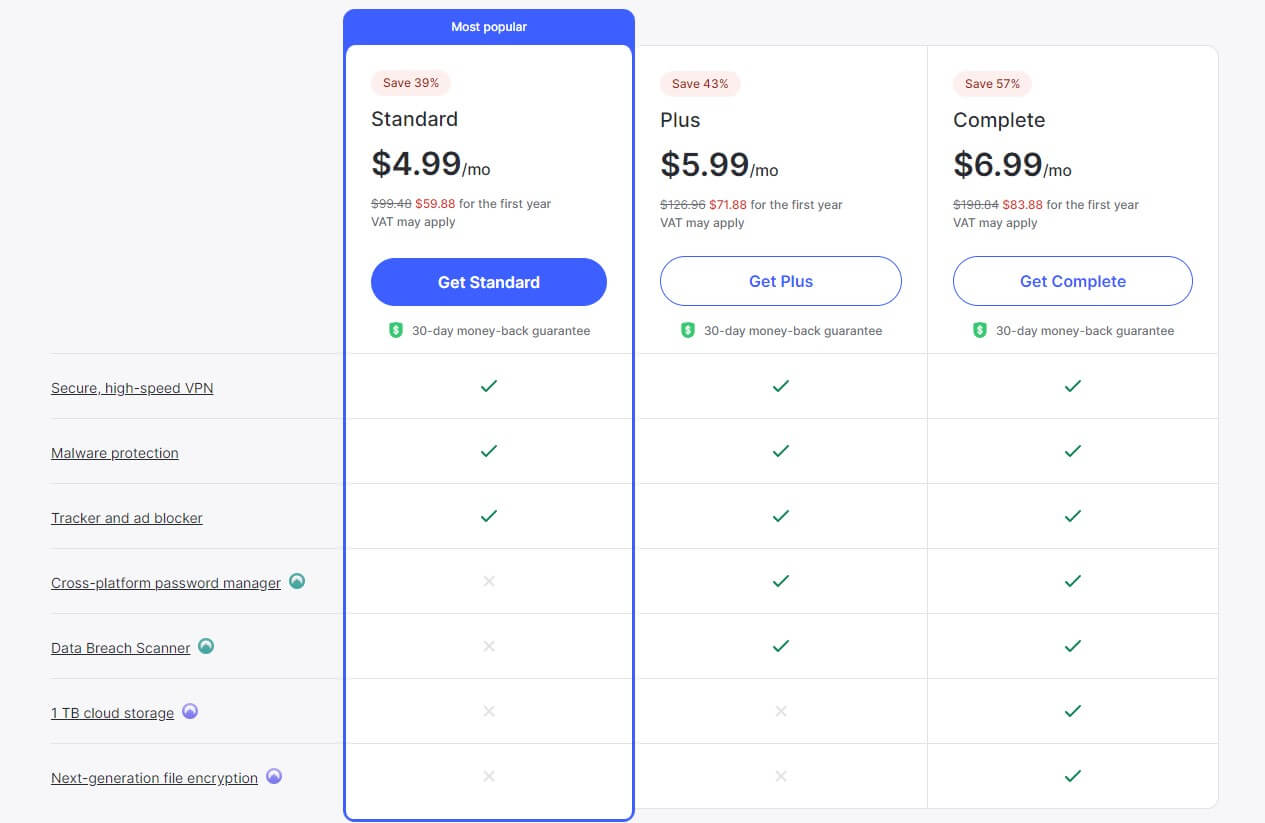
We also want to briefly mention its annual plans. Compared to many rivals – including TorGuard – these plans are surprisingly affordable. In particular, the Standard plan at under $5 a month with all the bells and whistles mentioned in this comparison.
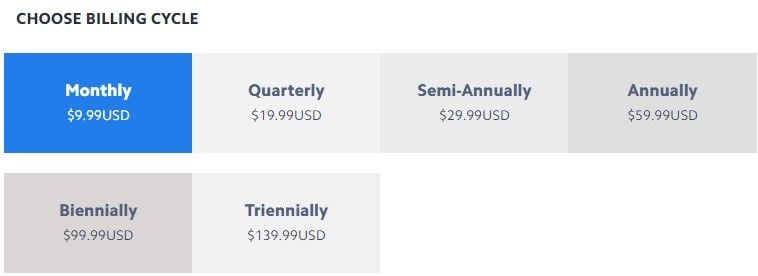
Moving on to TorGuard, it has more plans to pick from, making things more confusing. You can pick a subscription called Anonymous VPN with 8 simultaneous connections. Then, there’s the subscription called Anonymous VPN Pro with 12 of them.
Both of them offer SIX subscriptions to choose from if we’re not counting on the plan with 30 simultaneous connections, which you can only choose from the home page. Either way, the plan you see above is Anonymous VPN, so it comes with 8 connections per account.
This plan is priced similarly to NordVPN. Take the two-year plan at $99.99 a month and you’ll see that the price is almost identical. However, there’s this 3-year plan at $139.99 which is pretty expensive, as it translates to around $3.9 a month, yet, you’re committed for longer.
TorGuard isn’t very expensive in its base form but choosing more simultaneous connections will bump up the price. Moreover, don’t forget about dedicated streaming IPs! If you want to unblock a geo-restricted streaming platform, you must PAY additionally.
Add to this price $7.99 for a dedicated streaming IP and you’ll end up paying nearly $200 for 2 years only to be able to stream. And if you want more streaming IPs, you can double the price with no ability to get a refund on your purchase.
TorGuard, however, offers a 7-day refund policy on all of its plans, with add-ons like these being non-refundable. Is it something to be excited about? Definitely not.
Who Wins?
NordVPN WINS the final round of comparison against TorGuard. Why? Well, while the prices of these two are somewhat similar, TorGuard’s add-ons for streaming can seriously increase the price and make you pay twice or three times as much on top of your subscription.
Not to mention TorGuard’s 7-day money-back guarantee compared to NordVPN’s 30-day refund policy which makes the latter more approachable. And TorGuard’s long-term plans are even more expensive, especially if you choose a plan with 12 or 30 connections per account.
Conclusion: NordVPN Wins!
At the end of the day, I think the winner of this NordVPN vs TorGuard duel is pretty obvious. The final score is 9:1 for NordVPN which easily wins against TorGuard. On paper, NordVPN’s win sounds extremely brutal and it looks like TorGuard isn’t great, after all.
However, if you’ve read my comparison carefully, you noticed that TorGuard held its ground nicely but NordVPN managed to either edge it out slightly or beat it by a larger margin. For me, the only complaints regarding the US provider have to do with its streaming capabilities and pricing.
While support isn’t the best, it’s not a big deal for me. I’m more against its expensive dedicated streaming IPs and the fact that the provider isn’t very polished when talking about apps. NordVPN has it all, which is why it’s a winner at the end of the day.
The only complaint about NordVPN has to do with VAT (value-added taxes) which will increase the price in certain countries. Albeit, this is still a very affordable provider, especially having in mind all the features and functionalities you get.
To conclude, the logical way to go from here is to purchase NordVPN. We’re talking about two similarly-priced providers if we exclude streaming IPs from TorGuard. If you want every possible feature for a cheap price with no add-ons and other necessities, NordVPN is much better.
With a special discount for its 2-year plan and a 30-day refund period, you can use NordVPN risk-free and revel in all of its glory – isn’t that wonderful?